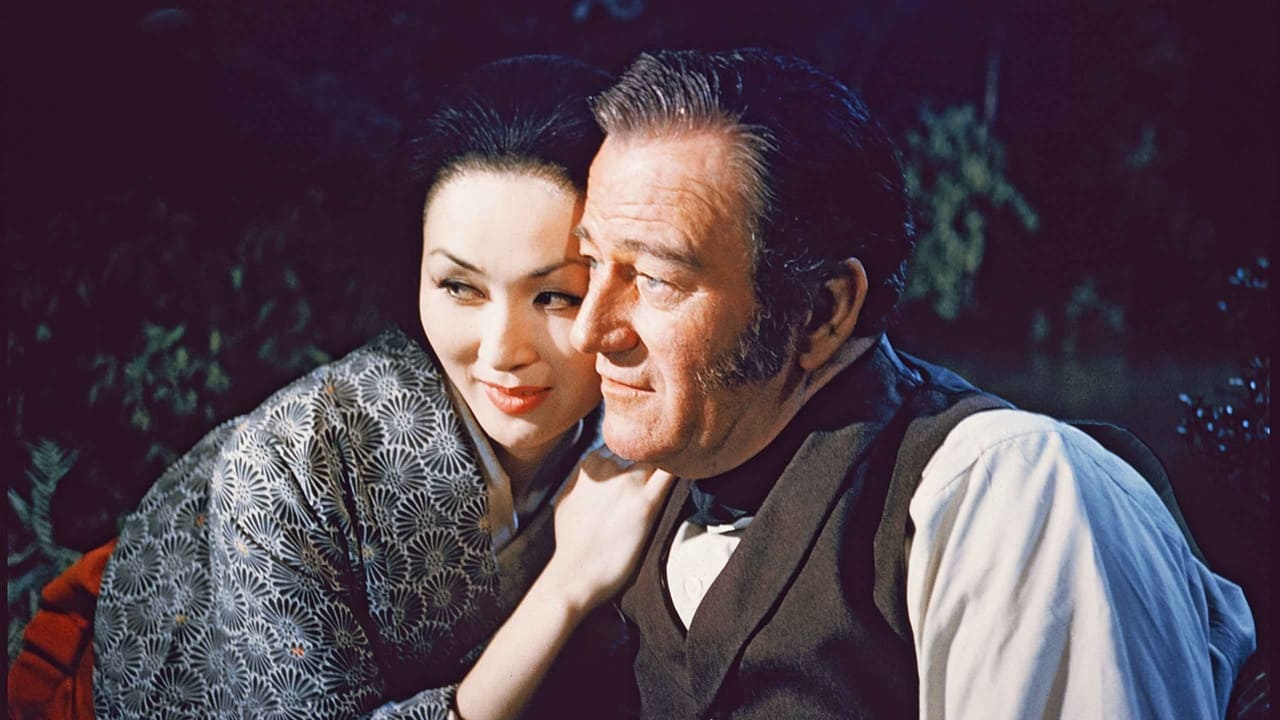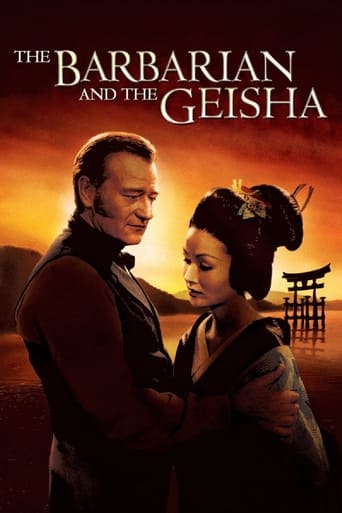

Perfectly adorable
... View MoreStrong acting helps the film overcome an uncertain premise and create characters that hold our attention absolutely.
... View MoreA terrific literary drama and character piece that shows how the process of creating art can be seen differently by those doing it and those looking at it from the outside.
... View MoreYes, absolutely, there is fun to be had, as well as many, many things to go boom, all amid an atmospheric urban jungle.
... View More. . . by bragging to the Shogunate Supreme Council of Japan in 1857 that there are men in America who are willing to die to end the Satanic Evil of Racist Slavery there. Of course, a few years later the words of Wayne's "Townsend Harris" character would be borne out in spades by the slaughter of more than 100,000 brave Northern Yankee Saints. Perversely enough, as "Il Duce" was mouthing the noble sentiments of Harris, Wayne was in the midst of hatching a Real Life plot to pump new life into one of History's most infamous Racist Devils by portraying Alamo Terrorist Davy Crockett, who personally murdered dozens of valiant Mexican Freedom Fighters in his eventually successful Genocidal Campaign to Re-enslave the Free Black People of Mexico's Texas Province for TWO MORE GENERATIONS!! Some accuse Hollywood starlets of being prostitutes simply because they might get paid to perform an explicit on-screen BJ upon their director as did Chloe Sevigney in BROWN BUNNY, but Mr. Wayne had no such economic need to hypocritically deviate from his own version of BOYS DON'T CRY (that is, THE BARBARIAN AND THE GEISHA) to the Sevigney-like job he did a few years later on Uncle Sam in THE ALAMO. The love of money may be the root of all Evil, but no amount of cash could bring GEISHA Okishi to stick with a mendacious phony like Wayne!
... View MoreI found this to be a surprisingly light-handed touch at a 1950's culture-clash movie. John Wayne would hardly be one's first choice as a cultural attache, being about as diplomatic with his good intentions as a bull-run in Harrods. But this time he was left to play a part that was far more passive than his usual bluff persona, and he accomplished his task with style. The Duke was a guy who really could act well. His facial expressions and body language could be extremely subtle.Despite his considerable presence both as an actor and in terms of screen time, he failed to dominate this movie. Many of his good intentions came a cropper. He had authority over nobody, and the intermittent narrative was provided by the titular geisha to whom he was the barbarian.The story of American attempts to curry favour with an isolationist Japan was one of political intrigue rather than swashbuckling or hell-for-leather battles. I cannot comment on the accuracy of its research but the strangeness of the Oriental culture to western sensibilities was demonstrated well. There was a great deal of minutely-choreographed ceremony entailing what looked to this observer like authentic costume and props. The set pieces were complex and detailed. A lot of money and thought had been applied to it.The fractured romance between Wayne and his geisha added a little extra element, and stopped the movie becoming just a political or flag-waving effort. Script was good without being too wordy. There was a great deal of Japanese dialogue, but the lengthy periods of translation didn't interfere with the narrative. It was nice to see plenty of genuine orientals on the set. Whether or not they were Japanese, I couldn't say. But anyway they looked the part. At least the leads were not played by cross-dressing Caucasians, unlike other efforts such as 'Blood Alley' (yes, I know they were Chinese) 'The Inn Of The Sixth Happiness' or even 'The King And I'.Frankly, I enjoyed this more than any of those other movies. The script was better for a start. I never liked the songs in 'The King And I', and wasn't impressed by the heavy-laden anti-communist subtext of 'Blood Alley'. I confess to never having seen this work before and found it compared very favourably to many of The Duke's more popular outings.Recommended.
... View MoreThis is very much not the sort of movie for which John Wayne is known. He plays a diplomat, a man who gets things done through words and persuasion rather than physical action. The film moves with a quiet realism through its superficially unexciting story.For the open-minded, the patient and the thoughtful, this movie is a rich depiction of an intriguing part of history.There are two intertwining stories. The big story is of internalised, isolationist Japan and externalised, expansionist America clashing when their interests conflict. The small, human, story is of an outsider barbarian (Wayne) and a civilised Geisha's initial hostility and dislike turning to mutual respect and love. The human story is a reflection of the greater story of the two nations.The movie is very well done and all actors play their roles well. The two lead roles are performed to perfection. John Wayne is excellent as Townsend Harris, striking exactly the right blend of force and negotiation in his dealings with the Japanese. Eiko Ando is likewise excellent as the Geisha of the title, charming and delightful. The interaction between her character and John Wayne's is particularly well portrayed. This is exactly how these two individuals (as they are depicted in the film) would have behaved.The script is very well written. It lacks all pomposity. and is a realistic depiction of the manner in which the depicted events may have occurred. The characters are real people, not self-consciously "great" figures from history. Furthermore, the clash of cultures and interests is portrayed with great skill and subtlety. Indeed, the clash of a traditionalist, and traditionally powerful, isolationist Japan and a rising, newly powerful nation from across the ocean is summarised very well in one exchange between John Wayne and the local Japanese baron. Wayne complains that shipwrecked sailors are beheaded if they land in Japan, and that passing ships cannot even put into port for water. The Baron responds that Japan just wants to be left alone. Wayne's character replies that Japan is at an increasingly important crossroads of international shipping, and that if things continue as before the nation will be regarded as nothing more than a band of brigands infesting an important roadway. A very real summary of the way in which the two countries each saw themselves as being in the right, and saw the other as being in the wrong. The resultant clash between two self-righteous peoples with conflicting interests has its reflections throughout history, a continuing theme that echoes into the present and on into the future.Cinematography and the depiction of mid-nineteenth century Japan, before the accelerated growth towards industrialisation that was to follow later in the century, is excellent. A visual treat, and an enlightening insight into Japan's ancient civilisation.I highly recommend anyone, whether a John Wayne fan or not, to watch this film if you get the chance. Just be aware that it isn't an action film. It is a representation of an interesting place and time in history, and a slow-boiling love story which (much to their surprise) comes to dominate the personal lives of the two main characters. Watch this film on its merits, without preconceptions, allow yourself to be immersed in its story, and you will thoroughly enjoy it.All in all, an excellent film.
... View MoreA Hollywood mini-epic that is more about the barbarian's political strategies than the geisha's sensual art. In fact, though John Wayne was the right choice for the role of Townsend Harris, the first US consul general in Japan, he looks awkward as a romantic lead, especially besides sleek Eiko Ando as the geisha. Huston handled the Japanese aspects of the story in a reverent fashion; the film even begs for subtitles, since he let the Japanese perform considerable portions of dialogue in their native language. As Wayne perhaps for different reasons- Huston must have felt attracted to the colonialist side of the story, but although it's known that Fox reshot scenes and re-edited the film, there wasn't much to do with a script concealing the expansionist interest in breaking Japan isolationism behind the Consul General's demagogy. A recommended curio.
... View More